仁爱英语七年级下重点短语及句型
七下仁爱英语重点句型

七下英语重点句型以下是七年级下册英语重点句型:1. 一般过去时的陈述句She was born in 1990.2. 一般过去时的疑问句Was she born in 1990?3. 现在进行时态的陈述句I am studying English now.4. 现在进行时态的疑问句Are you studying English now?5. 一般现在时态的陈述句He always helps me with my homework.6. 一般现在时态的疑问句Does he always help you with your homework?7. 一般将来时态的陈述句I will visit my grandparents next week.8. 一般将来时态的疑问句Will you visit your grandparents next week? 9. 祈使句的陈述句Please close the door.10. 祈使句的疑问句Will you close the door?11. 反意疑问句的陈述句She said that she would come to the party.12. 反意疑问句的疑问部分Did she come to the party?13. 条件句的陈述句If it rains, we will stay at home.14. 条件句的疑问句Will we stay at home if it rains?15. 比较结构的陈述句She is taller than her sister.16. 比较结构的疑问句Is she taller than her sister?17. 从句的陈述句When I was a child, I loved to read books.18. 从句的疑问句Did you love to read books when you were a child?19. 定语从句的陈述句The girl who is sitting next to me is my sister. 20. 定语从句的疑问句Which book are you reading?。
仁爱版初一英语下册重点词语句型语法1
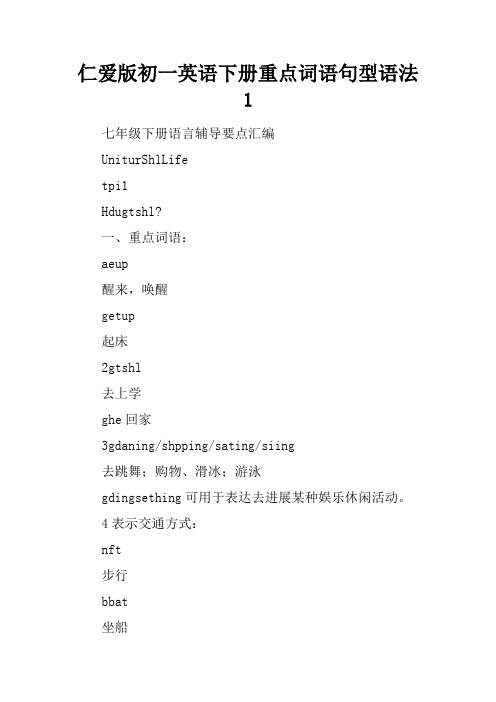
仁爱版初一英语下册重点词语句型语法1七年级下册语言辅导要点汇编UniturShlLifetpi1Hdugtshl?一、重点词语:aeup醒来,唤醒getup起床2gtshl去上学ghe回家3gdaning/shpping/sating/siing去跳舞;购物、滑冰;游泳gdingsething可用于表达去进展某种娱乐休闲活动。
4表示交通方式:nft步行bbat坐船bship坐船bair乘飞机bplane乘飞机btrain坐火车bsuba搭乘地铁bar坐小汽车bbus坐公共汽车bbie骑自行车taethesuba/bus/ar搭乘地铁;公共汽车;小汽车6driveaartr=gtrbar驾车去上班taeabustr=gtrbbus乘公共汽车去上班gtshlnft=altshl步行去上学7rideabie/hrse骑自行车;骑马8aftershl/lass放学以后;下以后9plathepian/guitar/vilin弹钢琴;吉他;小提琴plabasetball/ser/ftball 打篮球;踢足球;打橄榄球plaputergaes玩电脑游戏plaithaputer玩电脑plasprts做运动0nextt紧挨着,在…旁边1aplanfshl一幅我们学校的平面图2needas在工作日ateeends在周末3havebreafast/lunh/supper/dinner/eals 吃早餐;中餐;晚餐;正餐;一日三餐havelasses/lessns/aeeting上;上;开会4athTV/vies/gaes/theanials看电视;电影;比赛;动物readnvels/nespapers/bs看小说;报纸;书ashne’sfae/lthes洗脸;衣服6反义词:up–dn,earl–late近义词:quil–fastgetupearl早起belatefr迟到7thefirst/send/third/furthda第一;二;三;四天8leanthehuse清扫房子9表示建筑物〔尤其学校建筑物〕:ntheplagrund在操场atshl/he/table在学校;家里;桌旁inaputerr/teahers’ffie/lassrbuilding/g/librar/lab/anteen在电脑室;老师办公室;教学楼;体操馆;图书馆;实验室;食堂20arundsix’l=atabutsix’l大约在六点21频率副词:never,seld,seties,ften,usuall,alas二、重点句型:It’stietgetup该起床的时候了。
(完整版)仁爱版七年级英语下册知识点总结
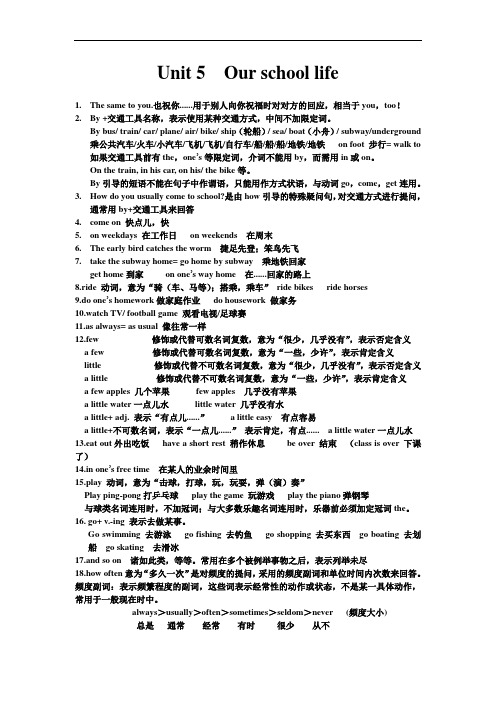
Unit 5 Our school life1.The same to you.也祝你......用于别人向你祝福时对对方的回应,相当于you,too!2.By +交通工具名称,表示使用某种交通方式,中间不加限定词。
By bus/ train/ car/ plane/ air/ bike/ ship(轮船)/ sea/ boat(小舟)/ subway/underground 乘公共汽车/火车/小汽车/飞机/飞机/自行车/船/船/船/地铁/地铁on foot 步行= walk to 如果交通工具前有the,one’s等限定词,介词不能用by,而需用in或on。
On the train, in his car, on his/ the bike等。
By引导的短语不能在句子中作谓语,只能用作方式状语,与动词go,come,get连用。
3.How do you usually come to school?是由how引导的特殊疑问句,对交通方式进行提问,通常用by+交通工具来回答e on 快点儿,快5.on weekdays 在工作日on weekends 在周末6.The early bird catches the worm 捷足先登;笨鸟先飞7.take the subway home= go home by subway 乘地铁回家get home到家on one’s way home 在......回家的路上8.ride 动词,意为“骑(车、马等);搭乘,乘车”ride bikes ride horses9.do one’s homework做家庭作业do housework 做家务10.watch TV/ football game 观看电视/足球赛11.as always= as usual 像往常一样12.few 修饰或代替可数名词复数,意为“很少,几乎没有”,表示否定含义a few 修饰或代替可数名词复数,意为“一些,少许”,表示肯定含义little 修饰或代替不可数名词复数,意为“很少,几乎没有”,表示否定含义a little 修饰或代替不可数名词复数,意为“一些,少许”,表示肯定含义a few apples 几个苹果few apples 几乎没有苹果a little water一点儿水little water 几乎没有水a little+ adj. 表示“有点儿......” a little easy 有点容易a little+不可数名词,表示“一点儿......”表示肯定,有点...... a little water一点儿水13.eat out外出吃饭have a short rest 稍作休息be over 结束(class is over 下课了)14.in one’s free time 在某人的业余时间里15.play 动词,意为“击球,打球,玩,玩耍,弹(演)奏”Play ping-pong打乒乓球play the game 玩游戏play the piano弹钢琴与球类名词连用时,不加冠词;与大多数乐趣名词连用时,乐器前必须加定冠词the。
仁爱版英语七年级下册unit6知识点
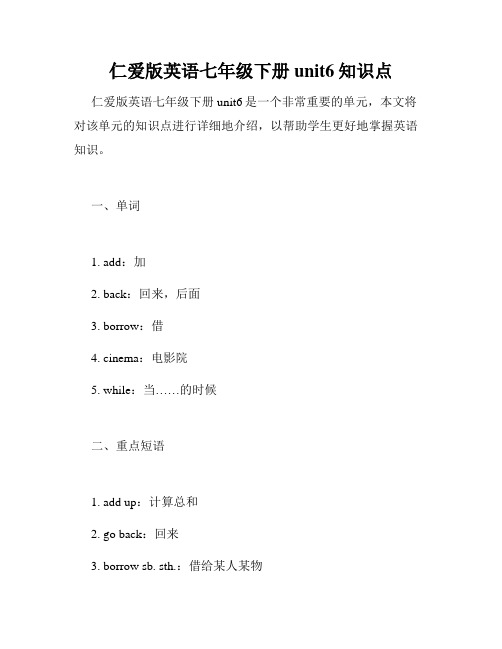
仁爱版英语七年级下册unit6知识点仁爱版英语七年级下册unit6是一个非常重要的单元,本文将对该单元的知识点进行详细地介绍,以帮助学生更好地掌握英语知识。
一、单词
1. add:加
2. back:回来,后面
3. borrow:借
4. cinema:电影院
5. while:当……的时候
二、重点短语
1. add up:计算总和
2. go back:回来
3. borrow sb. sth.:借给某人某物
4. go to the cinema:去电影院
5. while doing:在做……的时候
三、语法
1. There be句型
There be句型表示“有”、“存在”之意,例如:There is a book on the desk.即桌子上有一本书。
2. 句型I'm + doing sth.
这种结构常用来表达我们正在做某件事情,例如:I'm playing basketball. 即我正在打篮球。
四、例句
1. There is a cinema near our school.(我们学校附近有一家电影院。
)
2. I'm studying English while listening to music.(我边听音乐边学英语。
)
3. Can I borrow your pen for a moment?(我可以借用你的笔一下吗?)
总结
通过对仁爱版英语七年级下册unit6的学习,我们了解了很多单词、短语和语法结构。
好的掌握这些知识点,一定会对我们的英语学习帮助很大。
希望大家能够认真学习,并不断提高自己的英语能力。
仁爱版英语七下册重点句型总结

重点句型1.How do/does sb. go/come to...?2. How often do/does sb. do sth?3.What time do/does 主语do sth?4.What be +主语+doing?5.Where be +主语?6.How long can I keep...?7.How long is the computer? 8.What’s+介词短语?9.How many lessons do/does +主语+have every day? 10.What do you think of math?11.Why do/does +主语+like...?12.How many English classes/lessons do/does+主语+have every day?13.Which subject so you like best?14.Why not=Why don’t you +do...?15.How many +可数名词复数+are there+介词短语?16.How much+不可数名词+is there+介词短语?17.Is there +a+单数名词+介词短语?18. Is there+不可数名词+介词短语?19.Are there+可数名词复数+介词短语?20.What kind of home do you live in?21.Would you like me to help you?22.Excuse me, is there a...near here?23.Excuse me, how can I get to ...?24.Excuse me, which is the way to...?25.Excuse me, could you tell me the way to...?26.Excuse me, where is ...?27.How far is it from here?28.When was +单数主语+born?29.When were+复数主语+born?30.Where was +单数主语+born?31.Where were+复数主语+born?33.When is +形代/名词所有格+birthday?34.What day is it today?35. What day was it yesterday?36.What is the date today?37.What was the date yesterday?38.How do you plan to celebrate your birthday?39.What shape is...?=== What’s the shape of...?40.How wide is...?41.41.What do/does+主语+use ...for?42.What would you like to do at Kangkang’s birthday party?43.Do you want to sing Chinese songs or English songs?44.Can you play soccer or play the piano?45.What (else) can +主语+ do?46What could +主语+do when +主语+was/were +岁数?=What could +主语+do at the age of+岁数?47.How was your birthday?48.48.Did +主语+do...?49.What did+主语+do?50.50. What’s the matter (with sb/sth)?==What’s wrong (with sb/sth)?51.What time did you come back home last night?52.What’s the weather like today?= How is the weather today?53What was the weather like yesterday?=How was the weather yesterday?54.What’s the temperature in Beijing today?55.55.Which season do you like best?56.Where would you like to go?57.How do you plan to go there?58.Who would you like to go with?59.What places of interest would you like to visit?60.The summer holidays are coming.61.People can enjoy an eight-day holiday.62.Many people go to Tian’anmen Square to watch the national flag go up.63.Could you tell me something about...?64.Please give my best wishes to your parents.65.Children put on their clothes and greet their parents on the first day of lunar new year.66.The stay up and enjoy dumplings at midnight for good luck.ter that day, families usually have a get-together with a special dinner.68.They decorate Christmas trees with colorful lights, balls,stars and so on.69.Children put up stockings by the fireplace or at the end of their beds.70.People show their love for their mother by giving cards or presents.71.The boy often plays tricks on his classmates.72.You’d better know about the weather in different places in August.73.You shouldn’t stay in the sun too long.74.Don’t be late for school.75.I plan to take a trip to Mount Tai and take some photos.76.It sounds interesting.77.What’s the best time to go to Australia?78.What should I take with me?79.Each of us has a good plan for the holidays.80.We had a good time at the party last night.81.It’s rainy today, but it was sunny and warm yesterday.82.Everything comes back to life in spring.83.The farmers are busy harvesting in fall.84.Remember to put on your raincoat when you go outside85.The lowest temperature is -8 ℃ and the highest temperature is -2℃==The temperature is between -8 ℃ and -2℃= The temperature is from -8 ℃ to -2 ℃86.It’s the best time to climb hills.87.It’s a good time/season to do sth=It’s a good time/season for sth/doing sth.88.My mother bought a guitar for me yesterday.89. I made a model plane by hand last night.90.He made a wish and blew out the candles.91.I missed the chair and fell down.92.There was something wrong with her eyes when she was six.93.With my father’s help, I can swim now.94.I’m sure we’ll have agood time at the party.95.We use an Mp3 to listen to music.96.Go along this street and turn left at the second crossing. Walk on and across the bridge. It’s on you right You can’t miss it.97.You need to take the No.718 bus and then change to Bus No 106.98.There are many old people living here.99.It’s a townhouse with two floors.100.There is a lamp, some water and two books on the table.101.We are planning to go on a trip.102.She is cleaning the blackboard at the back of the classroom.103.We often do our homework in our free time.104.I think English is easy and interesting.105My teachers and classmates are kind/friendly to me.106She always walks to school.107 Mr. Lee fly yo Beijing twice a month.108.Y ou can keep my bike for two days.三、一般过去时随堂练习:一、用be动词的适当形式填空1.Yesterday______the first of June. It _____Children's Day. All the students ______ very excited.(be)2. She _______(be) happy yesterday.3. They _______ (be)glad to see each other last month.4. There ________(be) a sign on the chair last Monday.5.At the age of 6,my father________(have) to make money.6. ________(can) Tom perform magic tricks 5 years ago.二、句型变换1 There was a car in front of the house just now.否定句:_____________________________________________________一般疑问句:__________________________________________________肯定回答:____________________________________________________否定回答:____________________________________________________2 They played football on the playground.否定句:______________________________________________________一般疑问句:__________________________________________________肯定回答:____________________________________________________否定回答:____________________________________________________三、用所给动词的适当形式填空1. _______ he ______ the flowers this morning? Yes, he _____. (water)2. Her father _______ (read) a newspaper last night.3. We _________ to zoo yesterday. (go)4. ______ you _______ (visit) your relatives last Spring Festival?5. Gao Shan _______ (pull) up carrots last National Day holiday.6. I ____________ (sweep) the floor yesterday.7. What _________ she _________ (find) in the garden last morning?8. It _________ (be) Ben's birthday last Friday9. We all _________ (have) a good time last night.10. He _________ (jump) high last Sports Day.11. She likes _______ newspapers, but she ______ a book yesterday. (read)12. Jim's mother _________ (plant) trees just now.13. I _______ (watch) a cartoon last Monday.14. It ____ (be) the 2nd of November yesterday.15. Gao Shan ________ (put) the book on his head a moment ago.16. Don't ______ the house. Mum _______ it yesterday. (clean)17. What _________ you ______ just now? I ______ some housework. (do)18. They _________ (make) a kite a week ago.19. I want to _____ apples. But my dad _____ all of them last month. (pick)(四)一般将来时1.定义:一般将来时表示要在将来的某个时间内发生,是―纯粹的将来动作‖,或表说话人的意图、打算或某种可能性3.按计划要发生的动作或命令他人做某事常与一般过去时常与表示过去的时间状语连用,如:明天(tomorrow)明天晚上(tomorrow morning),下个星期(next week),下个月(next month),后天(the day after tomorrow),在将来(in the future),这个星期天(this Sunday) 在2050年(in 2050)三天后(three days later),三天内(in five days),今晚(toning),在这个星期天下午(this Sunday afternoon), 很快(soon)等时间状语连用2.结构:(1).由will +v.动词原形构成,will的否定是(will not=won’t)e.g. I will not be free tomorrow .我明天没空。
(完整版)仁爱英语七年级下重点短语及句型
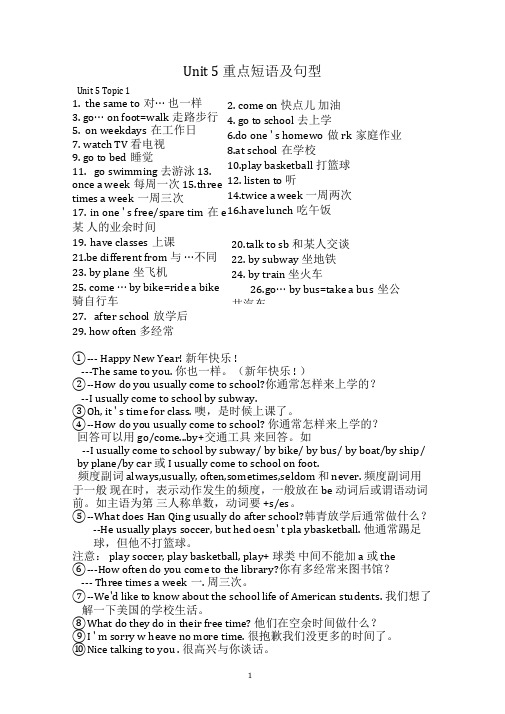
Unit 5 重点短语及句型Unit 5 Topic 11. the same to 对⋯ 也一样 3. go ⋯ on foot=walk 走路步行 5. on weekdays 在工作日 7. watch TV 看电视 9. go to bed 睡觉 11. go swimming 去游泳 13.once a week 每周一次 15.three times a week 一周三次17. in one ' s free/spare tim 在e 某 人的业余时间19. have classes 上课 21.be different from 与 ⋯不同 23. by plane 坐飞机 25. come ⋯ by bike=ride a bike 骑自行车 27. after school 放学后29. how often 多经常① --- Happy New Year! 新年快乐 !---The same to you. 你也一样。
(新年快乐 ! ) ② --How do you usually come to school?你通常怎样来上学的?--I usually come to school by subway. ③ O h, it ' s time for class. 噢,是时候上课了。
④ --How do you usually come to school? 你通常怎样来上学的?回答可以用 go/come...by+交通工具 来回答。
如--I usually come to school by subway/ by bike/ by bus/ by boat/by ship/ by plane/by car 或 I usually come to school on foot.频度副词 always,usually, often,sometimes,seldom 和 never. 频度副词用于一般 现在时,表示动作发生的频度,一般放在 be 动词后或谓语动词前。
仁爱英语七年级下册重点句子整理
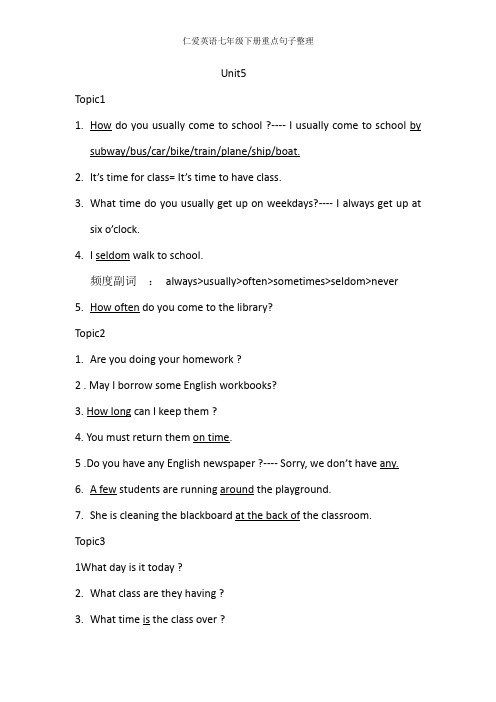
Unit5Topic11.How do you usually come to school ?---- I usually come to school bysubway/bus/car/bike/train/plane/ship/boat.2.It’s time for class= It’s time to have class.3.What time do you usually get up on weekdays?---- I always get up atsix o’clock.4.I seldom walk to school.频度副词:always>usually>often>sometimes>seldom>never5.How often do you come to the library?Topic21.Are you doing your homework ?2 . May I borrow some English workbooks?3. How long can I keep them ?4. You must return them on time.5 .Do you have any English newspaper ?---- Sorry, we don’t have any.6.A few students are running around the playground.7.She is cleaning the blackboard at the back of the classroom.Topic31What day is it today ?2.What class are they having ?3.What time is the class over ?4.What time does the next class begin ?5.How many lessons does he have every weekday ?6.It's 10:20 on Thursday morning now.8.I think you must like English very much.9.What do you think of it ?= How do you like it ?10.W hich subject do you like best ? ---- I like …. best.11.I like history best , because I think it’s easy and interesting.12.I don’t like math. I think it’s a little difficult and boring.13.A t school, my teachers and classmates are very kind to me.14.M y school life is very interesting.15.I study Chinese, English, math and some other subjects.16.It's my favorite outdoor activity.16.A ttention, please !17.T here is a soccer game between Class One and Class Two.18.D o you want to see different kinds of stamps ?Unit6Topic 11. Where is your bedroom?-----It's on the second floor.2. There is a study next to my bedroom .3. There is a sofa, a desk, some books and so on .4. Why not go upstairs and have a look ?5. Is there a computer in your study ?6. Are there any English books in your study ?7. There is one next to my family photo on the wall.8. There are so many books on the shelves.9. What’s i n front of the classroom ?10. Put them away , please .11. You must look after your things .12. There aren’t any trees .13. Now I’m helping my father clean the study.14. How many model planes are there ? / How much water is there ?15. What kind of home do you live in ?16. They live in a big farmhouse in the country .17. How many floors are there in your buildings ?18. Look for a quiet room for two two people under 500 yuan .19. Call Bob at 139-7382-4946.20. Would you like me to help you ?21. I’m looking for a store . Are there any near here ?22. Mr.Smart lives at the end of Park Road.23. There are many old people living here.24. There are many shops and restaurants close to my home.25. Our school is not far from here .26. Excuse me , where is the library ?/Is there a library near here ?which is the way to the library ?how can I get to the hospital ?could you tell me the way to the library ?19.T he bookstore is across from the school.20.T he library is on the corner of Xinhua Street and Zhongshan Road.21.You can’t miss it.22.H ow far is it from here ?------It’s about 15 kilometers away from here.23.You should change to the No.108 bus.24.E very year many people get hurt or lose their lives in traffic accidents.25.We must stop and look both ways .26.W e must never play on the street.27.It’s good to help children and other people cross the street.Unit7Topic 1Topic 2Topic 3Unit 8 Topic 1Topic 2。
仁爱版英语七年级下全部知识点总结
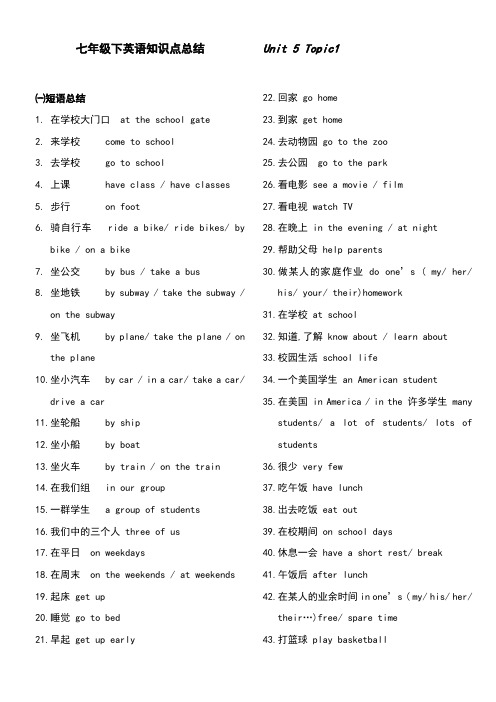
七年级下英语知识点总结Unit 5 Topic1㈠短语总结1.在学校大门口 at the school gate2.来学校 come to school3.去学校 go to school4.上课 have class / have classes5.步行 on foot6.骑自行车 ride a bike/ ride bikes/ bybike / on a bike7.坐公交 by bus / take a bus8.坐地铁 by subway / take the subway /on the subway9.坐飞机 by plane/ take the plane / onthe plane10.坐小汽车 by car / in a car/ take a car/drive a car11.坐轮船 by ship12.坐小船 by boat13.坐火车 by train / on the train14.在我们组 in our group15.一群学生 a group of students16.我们中的三个人 three of us17.在平日 on weekdays18.在周末 on the weekends / at weekends19.起床 get up20.睡觉 go to bed21.早起 get up early 22.回家 go home23.到家 get home24.去动物园 go to the zoo25.去公园 go to the park26.看电影 see a movie / film27.看电视 watch TV28.在晚上 in the evening / at night29.帮助父母 help parents30.做某人的家庭作业 do one’s ( my/ her/his/ your/ their)homework31.在学校 at school32.知道,了解 know about / learn about33.校园生活 school life34.一个美国学生 an American student35.在美国 in America / in the 许多学生 manystudents/ a lot of students/ lots of students36.很少 very few37.吃午饭 have lunch38.出去吃饭 eat out39.在校期间 on school days40.休息一会 have a short rest/ break41.午饭后 after lunch42.在某人的业余时间in one’s ( my/ his/ her/their…)free/ spare time43.打篮球 play basketball44.踢足球play soccer / football45.弹钢琴 play the piano46.弹吉他play the guitar47.拉二胡 play erhu48.去游泳 go swimming / go for a swim49.去划船 go boating50.球赛 a ball game / ball games51.一年四次 four times a year52.听音乐 listen to music53.读书 read books54.看报 read newspapers 55.看医生 see a doctor56.去图书馆 go to the library57.一周两次 twice a week58.见朋友 meet friends59.每天 every day60.在七点半 at half past seven61.一小会 for a little while / for a shorttime62.晚饭后 after supper63.吃饭 have dinner64.吃早饭 have breakfast㈡重要句型1.I usually come to school by subway.同义句: I usually take the subway to school.对划线部分提问: How do you usually come to school类似的有:go to school by bike=go to schoolon a bike= ride a bike to school=ride to schoolgo home by bus=go home on a bus=take a bus home2.How do you usually/ often…你通常/经常怎样…3.It’s time for class.=It’s time to haveclass. =It’s time for having class.4.What about you =How about you5.How often …询问频率,回答可以用频率副词:always, usually, often, sometimes, seldom, never, every day ,every +其他时间名词或表示频率的短语回答表示频率的短语:次数+单位时间. : once a day / twice a week / three timesa month6. The early bird catches the work. (谚语) 笨鸟先飞7. Work / Study must come first. 工作/ 学习必须放在第一位!8. Classes begin at eight. =Class begins at eight.提问: What time does the class begin / What time do the classes begin㈢重要单词的用法1.look (感官动词) 看起来,后面加形容词His mother looks very young.They look very cute.Her dress looks very nice.You look very cool in this coat.2.by 介词by 后面直接加表示交通工具的名词,中间不用任何词修饰,如:by bikeby +动词ing形式,表示通过某种方式People show love to their mothers by giving cards.You can be a good student by working hard.3.over (形容词)School / Class is over.4.begin现在分词: beginning 过去式: beganbegin to do sth , begin doing sthHe begins to write a letter. =He begins writing a letter.如果begin本身为分词,只能用begin to do sthHe is beginning to run.5.listen to 听(动作), hear 听见(结果)6.always 反义词 never7.本话题涉及的时态为一般现在时,句中常有频率副词或表示频率的短语,如果主语为三单,动词一定要用三单!(四)易错题1.You new watch ______ (look) very nice!2.Here ______(be) some news.3.Oh, come on! It’s time_____ going toschool.4.They usually go to school on________(feet).5.In my class, forty of _______(we) go toschool by bike.6.The early bird ______ (catch) the worm.7.Kangkang often _____ (ride) a bike to thepark.8.What time _____ (be)school over9.Work must come ______(once).10.It’s time ____you to get up.11.We often _____ books in the morning.12.Jill’s friend like ______(study) in ourschool.13.Mr. Wang teaches ______(we) English._____ of us like him.14.How about ______(go) out with me15.Most students go to school _____ theschool bus.16._______ do you go shopping with yourmotherA. How soonB. How farC. How oftenD. How much17.What time do you usually get up _____weekdays18.He ______ busy, so he has no time to playwith us.A. is alwaysB. seldom isC. always isD. often is19. The last class______(finish) at twelve o’clock.20. Let’s go______(boat).21. It’s time to have breakfast. (同义句) _________________________________________ _____________.22. Michael often rides a bike to school. (同义句)_________________________________________ _____________.23. I always go to work on foot. (对划线部分提问)_________________________________________ _____________.24. My mother goes shopping twice a week. (对划线部分提问)_________________________________________ _____________.25. Mary always reads books in the library. (反义句)_________________________________________ _____________.26. He usually does his homework at school. (否定句)_________________________________________ _____________.27. They often go to school by bus in the morning. (对划线部分提问)_________________________________________ _____________.28. Jane seldom watches TV on weekdays. (改为一般疑问句)_________________________________________ _____________.29. He usually has lunch at home. (对划线部分提问)_________________________________________ _____________.30. Li Ping often goes to work on foot. (同义句)_________________________________________ _____________.31. 几乎没有学生乘地铁去学校。
仁爱版七年级下册英语复习知识点
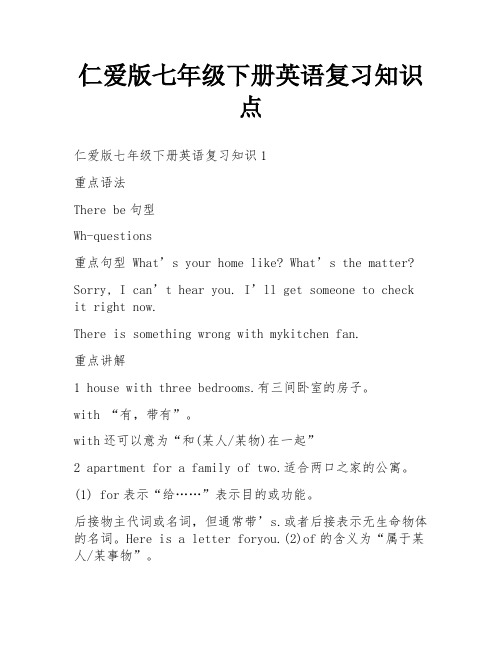
仁爱版七年级下册英语复习知识点仁爱版七年级下册英语复习知识1重点语法There be句型Wh-questions重点句型What’s your home like? What’s the matter?Sorry, I can’t hear you. I’ll get someone to check it right now.There is something wrong with mykitchen fan.重点讲解1 house with three bedrooms.有三间卧室的房子。
with “有,带有”。
with还可以意为“和(某人/某物)在一起”2 apartment for a family of two.适合两口之家的公寓。
(1) for表示“给……”表示目的或功能。
后接物主代词或名词,但通常带’s.或者后接表示无生命物体的名词。
Here is a letter foryou.(2)of的含义为“属于某人/某事物”。
She is a friend of Lily’s. = She is Lily’s friend.3 What’s the matter?怎么了?该句常用来询问某或某物出了什么什么问题或毛病;询问具体某人或某物出了什么问题时,还可以表达为:What’s the matter with sb./sth.某人或某物出了什么毛病。
What’s the matter? = What’swrong?4 Ihear you playing the piano.我听见你在弹钢琴。
hear…doing sth.“听见……在做某事”,强调正在进行的动作。
hear…dosth.“听见……做了某事”,强调全过程。
hearabout sth.听到关于某事物的消息 hear from sb.接到某人的来信、电话等hear of sb./sth.听到或知道某人或某事物的情况5 a lot of = lots of许多后接可数名词,相当于many;后接不可数名词,相当于much,用于肯定句中;但是注意:如果是否定句,则常用many或much.6 be far from… 离……远(抽象距离)be…away from…离……远(具体距离)My school is not far from thebookstore. The sea is 2 miles away fromthe hotel.7 There is something wrong with sb./sth.某人或某物出问题/有毛病了。
仁爱版英语七年级下册知识点归纳(完整版)

仁爱版英语七年级下册知识点归纳(完整版)-CAL-FENGHAI-(2020YEAR-YICAI)_JINGBIAN仁爱版英语七年级下册知识点归纳?英语七年级下册知识点归纳Unit?5?Topic1?重点语法一般现在时(常与频度副词never,?seldom,?sometimes,?often ,usually,?always等连用)重点句型?—How?do?you?usually?come?to?school???—I?usually?come?to?school?by?subway.????????????—How?often?do?you?go?to?the?library????—Once/Twice/Three?times?a?week/Very?often/Every?day/Seldom重点详解1I?always?come?to?school?by?bus.???by+交通工具名称,表示使用某种交通方式,中间不加限定词,如果交通工具前有a,?the,?my?等限定词,就不能用by,而是用in或是on.???on?the?train=by?train???on?his?bike=by?bike???in?my?car=by?car.???巧辩异同on?foot?与?walk????on?foot?“走路”,是介词短语,不能作谓语,只作方式状语,位于句末。
??walk?“走路”,是动词,可以作谓语。
? ? ??go?to…on?foot=?walk?to? ? ???I?often?go?to?school?on?foot.?=I?often?walk?to?school.?????同样,go?to….by?bike?=?ride?a?bike?to?????? ? ? ? ? go?to….?by?car?=?drive?a?car?to????????? ??go?to?…?by?plane?=?fly?to????????? ? ? ? ? go?to…?by?bus?=?take?a?bus?to2???Come?on!?It’s?time?for?class.???????come?on?“快点,加油,来吧”。
仁爱英语七年级下短语知识点总结
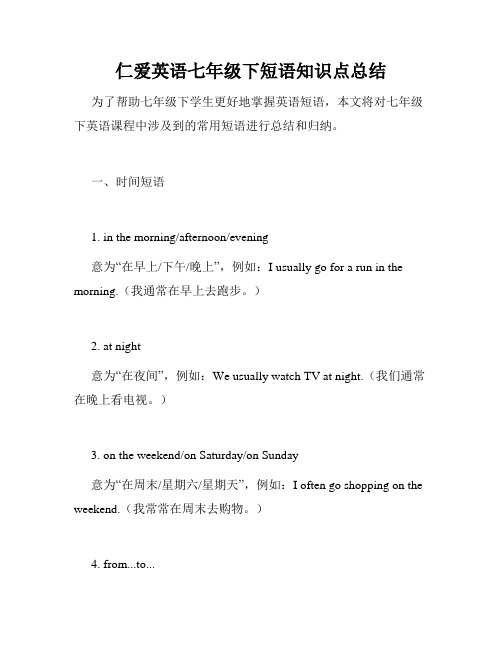
仁爱英语七年级下短语知识点总结为了帮助七年级下学生更好地掌握英语短语,本文将对七年级下英语课程中涉及到的常用短语进行总结和归纳。
一、时间短语1. in the morning/afternoon/evening意为“在早上/下午/晚上”,例如:I usually go for a run in the morning.(我通常在早上去跑步。
)2. at night意为“在夜间”,例如:We usually watch TV at night.(我们通常在晚上看电视。
)3. on the weekend/on Saturday/on Sunday意为“在周末/星期六/星期天”,例如:I often go shopping on the weekend.(我常常在周末去购物。
)4. from...to...意为“从......到......”,例如:I study from Monday to Friday.(我从周一到周五学习。
)二、地点短语1. at home/at school/at the park意为“在家/在学校/在公园”,例如:I like to play with my dog at home.(我在家里喜欢和我的狗玩。
)2. in the city/in the country/in the mountains意为“在城市里/在农村里/在山里”,例如:We live in the city.(我们住在城市里。
)3. on the street/on the road/on the sidewalk意为“在街上/在路上/在人行道上”,例如:I like to walk on the sidewalk.(我喜欢在人行道上散步。
)4. by the seaside/by the lake/by the river意为“在海边/在湖边/在河边”,例如:We had a picnic by the river.(我们在河边野餐。
2020仁爱版初中英语七年级下册知识点、重点句型、单词归纳
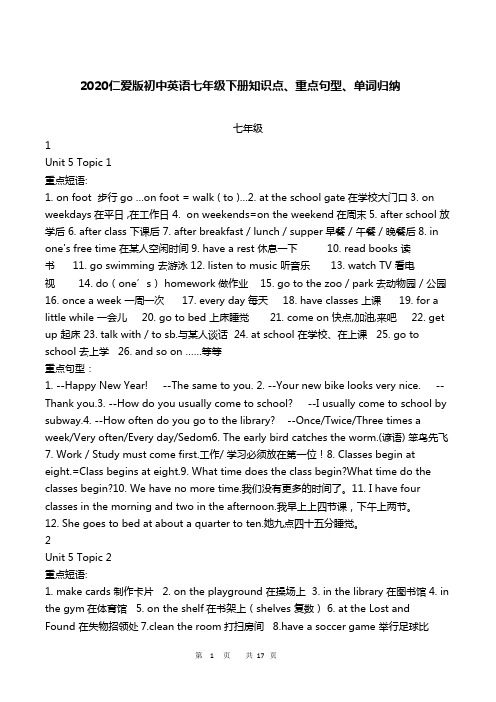
2020仁爱版初中英语七年级下册知识点、重点句型、单词归纳七年级1Unit 5 Topic 1重点短语:1. on foot 步行go …on foot = walk ( to )…2. at the school gate在学校大门口3. on weekdays在平日 ,在工作日4. on weekends=on the weekend在周末5. after school 放学后6. after class 下课后7. after breakfast / lunch / supper早餐 / 午餐 / 晚餐后8. in one's free time在某人空闲时间9. have a rest 休息一下 10. read books 读书 11. go swimming 去游泳 12. listen to music 听音乐 13. watch TV 看电视 14. do(one’s) homework 做作业 15. go to the zoo / park去动物园 / 公园16. once a week 一周一次 17. every day 每天 18. have classes 上课 19. for a little while 一会儿 20. go to bed 上床睡觉 21. come on 快点,加油,来吧 22. get up 起床 23. talk with / to sb.与某人谈话 24. at school 在学校、在上课 25. go to school 去上学 26. and so on ……等等重点句型:1. --Happy New Year! --The same to you.2. --Your new bike looks very nice. --Thank you.3. --How do you usually come to school? --I usually come to school by subway.4. --How often do you go to the library? --Once/Twice/Three times a week/Very often/Every day/Sedom6. The early bird catches the worm.(谚语) 笨鸟先飞7. Work / Study must come first.工作/ 学习必须放在第一位!8. Classes begin at eight.=Class begins at eight.9. What time does the class begin?What time do the classes begin?10. We have no more time.我们没有更多的时间了。
仁爱版英语七年级下册英语语法知识总结

七年级下册英语语法一、there be1. there be句型一1句型结构为:there beis/are+某物/某人+地点/时间介词短语;意为“某处/某地有某人或某物”;表示存在的一种状态;句中be动词的选择由其后面的名词确定.有两种句式:①There is +单数名词/不可数名词+介词短语..②There are +名词复数形式+介词短语..③be动词后面的名词如果是由and连接的几个名词时.be动词应遵循就近原则;即与邻近名词的数保持一致..2there be结构的否定句直接在be动词后面加not..3there be结构的疑问形式直接把be动词提前;句末加问号..肯定回答:Yes;there is/are.否定回答:No;there isn't/aren't .-Are there any books about Chinese history 有关于中国历史的书吗-Yes.there are./No;there aren't. 是的;有../不;没有..-Is there a computer in your study 你的书房有电脑吗-Yes;there is;/No;there isn't. 是的;有../不;没有..2. there be句型二1针对there be结构的名词提问;常常用what's+地点状语;名词无论是单数形式还是复数形式;be动词都用is;且常省略there..如:There is a desk in the room. 对画线部分提问房间里有张桌子..—— What's in the room 房间里面有什么There are many students in the classroom.对画线部分提问教室里有许多学生..——教室里面有什么2针对there be结构中名词的数量提问;用how many或how much提问;后面要紧跟这个名词 .如:There' s a coat on the bed对画线部分提问在床上有一件衣服..——How many coats are there on the bed 在床上有多少件衣服There' re some meat in the bowl 对画线部分提在碗里有一些肉..——在碗里有多少肉3. there be句型三there be与havehas的用法区别:there be句型表示“某处/某时有某物或某人”;强调的是一种客观存在;但have表示“某人或某物有……”;强调的是拥有或占有;即某物或某人与主语是所属关系;但有时它们也可以相互转换..二、时态1. 一般现在时常与频度副词never; seldom; sometimes; often;usually等连用一般现在时表示:1现在所处的状态..Jane is at school.2经常或习惯性的动作..I often go to school by bus.3主语具备的性格和能力..He likes playing football.4客观真理..The earth goes round the sun.常用的时间状语:often; always; usually; sometimes; every day等等..行为动词的一般现在时;助动词是do/don’t和does/doesn’t.当主语是第一、二人称和所有复数形式时;行为动词用原形..肯定式:I go to school on foot.否定式:I don’t go to school on foot.疑问式:Do you go to school on foot —Yes; I do. —No; I don’t.当主语是第三人称单数时;动词用第三人称单数形式;在词尾加-s或-es..肯定式:He goes to work by bus.否定式:He doesn’t go t o work by bus.疑问式:Does he go to work by bus —Yes; he does. —No; he doesn’t.重点句型—How do you usually come to school —I usually come to school by subway.—How often do you go to the library —Once/Twice/Three times a week/Very often/Every day/Selgo to…on foot= walk to I often go to school on foot. =I often walk to school.go to…by bike = ride a bike to ...go to…by car = drive a car to ...go to…by plane = fly to ...go to…by bus = take a bus to ...2. 现在进行时⑴现在进行时表示正在发生或进行的动作;常与now; at the moment; look; listen等词语或者短语连用..⑵结构:主语+beis;am;are+现在分词..如:Mary is having lunch with her parents now. 玛丽正和她的父母一起吃午餐..They are doing their homework at home. 他们正在家里做家庭作业..现在进行时态的肯定、否定和疑问式肯定式:I am running. You are running. He/She is running.否定式:I’ m not running. You are n’ t running. He/She is n’ t running.一般疑问句及回答:—Are you running —Yes; I am./—No; I am not.—Is he/she running —Yes; he/she is./ No. he/s he isn’ t.⑶动词的现在分词的构成规则:① 一般在词尾加-ing.. 如:drink-drinking②以不发音字母e结尾的动词;先去e;再加ing..如:make-making close-closing have-having③以重读闭音节结尾的动词;且词尾只有一个辅音字母;应先双写这个辅音字母;再加ing..如:sit-sitting begin-beginning shop-shopping三.情态动词情态动词基本用法:情态动词+动词原形can能力体力;智力;技能/允许或许可口语中常用/可能性can和could“可能”;could表示可疑的可能性;不及can’t语气强;用于肯定、否定、疑问句中..Can he be in the office now No; he can’t be there; for I saw him in the library just now.语气很强;常用于疑问句和否定句中must必须;应该表主观要求:must“肯定;一定”语气强;只用于肯定句中..例如:He must be a man from America.You must obey the traffic rules.should 应当;应该表义务责任/本该含有责备意味will意愿;决心请求;建议;用在问句中would比较委婉will not/won’t do四.数词数词有两种:1.表示数目的词叫基数词;如one;two;three;four等;2.表示顺序的词叫序数词;如first;second;third;fourth等;使用序数词时前面必须加the;但之前有this/that /my等限五.常用的表达方式1.表示时间的介词用法Iin用于一段时间..如年份、季节、月份等..如:in 2012在2012 in spring在春季 in February在二月2on用于具体的某一天或某一个特定的上午、下午或晚上..如:on Saturday 在星期六 on October lst;2012 在2012年10月1日on a rainy morning在一个下雨天的早晨3at用于具体的时刻..如:at 7:30在7:304一些固定搭配..如: at night ;at noon ; in the morning/afternoon/evening2. 介词用法小结lin意为“在…里”..如:The boxes are in the drawer.盒子在抽屉里..2on意为“在…表面上”..如:The fork is on the plate叉在盘子上..3behind意为“在……后面”..如:What can you see behind the chair4under意为“在…下”..如:What's under the bed 床下面是什么5near意为“在…附近”..如:My home is near a bookshop我家在书店附近..6next to...意为“挨近;靠近”..如:Who is sitting next to you 谁坐在你旁边7in front of意为“在……前面”..如:There is a big tree in front of the garage. 在车库的前面有一棵大树..8in the center of意为“在……中心”..如:There is a park in the center of the city. 在城市的中心有一个公园..9on the left/right of意为“在……左边/右边”..如:Tom sits on the left of Jack.汤姆坐在杰克的左边..10at the back of意为“在……后面”..如:Who is that boy sitting at the back of the classroom坐在教室后面的男孩是谁3.特殊疑问词小结lwhat意为“什么”..如:what class什么班级 what time几点 what color什么颜色 what kind of什么种类的 what day星期几2which+n.意为“哪一个些”..3问方式及状况:how问数量多少:how many+可数名词复数how much+不可数名词问多少钱:how much+ -般疑问句4问频率:How often+ -般疑问句;意为“多久一次…..”.. 5问多长时间或物体有多长:how long6问年龄:how old7问多远/多高/多宽how far/high/tall/wide8问原因:why9问地点:where10问何时:when11问是谁who4.问路与指路的表达方式l问路的表达方式:Is there a... nearby/near hereWhere is...Can you tell me the way to...Could you tell me how to get to...How can I get to:..Which is the way to..2指路的表达方式:go down/along the street go straight tum left/righton the right/left There is a... on the left/right5. how long;how far与how often的用法lhow long意为“多久”;常常对一段时间提问..如:You can keep the book for a week.对画线部分提问你能借这本书一周..我能借这本书多久2how far意为“多远”;常常对表示距离的词提问..如:It is five kilometers away from here to my school对画线部分提问从这到学校有5公里远..从这儿到你学校有多远3how often意为“多久一次”;常常对表示频率的词提问..表示频率的词有:always;never;seldom;often;usually;every day;once/twice a week 等..如:He often goes to the park.对画线部分提问他经常去公园..他多久去一次公园巧辩异同 1. a few与few a few “一些”;few“很少;几乎没有”;修饰可数名词..a little与little a little“一些”;little“很少;几乎没有”;修饰不可数名词..2. talk; say; speak与tell1 talk“交谈”;表示通过谈话方式交换意见、消息等..2 speak“说话”;强调开口发声;后常接某种语言..3 say “说”;强调所说的话的内容..4 tell“告诉”;有时兼含“嘱咐”“命令”等..tell a truth说真话;tell a lie说谎; tell a story 讲故事等固定搭配..拓展: go+v.-ing 表示去做某事:go fishing 去钓鱼 go shopping 去购物 go boating 去划船范例作文My School LifeHi I am Li Ping. I’m fourteen years old. I come from a small village of Fujian. I am a student of Class 5; Grade 7. My School life is very interesting. Class begins at 7:45a.m. I have five classes in the morning. In the afternoon; I often have three classes. We learn Chinese; English; math; history; biology; geography; politics; physics and so on. I like P.E. best. Because having sports is good for us. Sometimes; I go to the school library. In my spare time; I often practice speaking English with my good friends. And my teachers and classmates are very friendly to me. I like my school life very much.My HomeWelcome to my home This way please Look In front of my home; there is a big yard. There are some trees and flowers in the yard. The kitchen and dining room is on the first floor. On the second is a living room; a study; two bathrooms and three bedrooms. The living room is in the center of the house. We often watch TV there. My bedroom is on the right of the house. There are pictures on the wall. There is a computer on my desk. I often study on it. I like English; so there are many English books in my room Is it my bedroom beautiful。
仁爱英语七年级Unit-6-知识点归纳
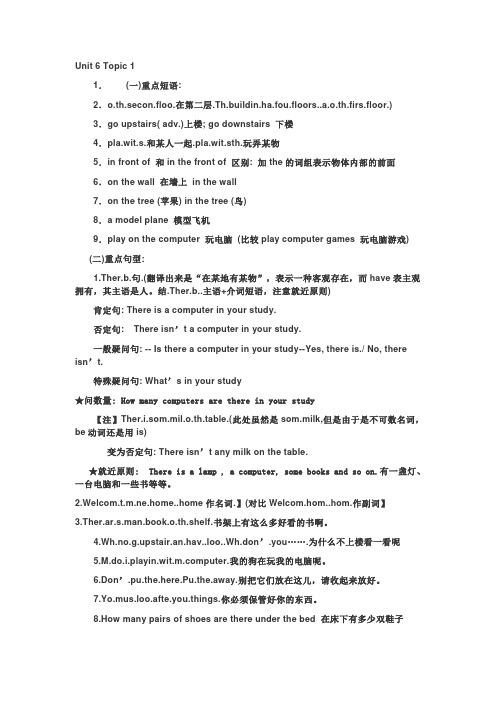
Unit 6 Topic 11.(一)重点短语:2.o.th.secon.floo.在第二层.Th.buildin.ha.fou.floors..a.o.th.firs.floor.)3.go upstairs( adv.)上楼; go downstairs 下楼4.pla.wit.s.和某人一起.pla.wit.sth.玩弄某物5.in front of 和in the front of 区别: 加the的词组表示物体内部的前面6.on the wall 在墙上in the wall7.on the tree (苹果) in the tree (鸟)8.a model plane 模型飞机9.play on the computer 玩电脑(比较play computer games 玩电脑游戏)(二)重点句型:1.Ther.b.句.(翻译出来是“在某地有某物”,表示一种客观存在,而have表主观拥有,其主语是人。
结.Ther.b..主语+介词短语,注意就近原则)肯定句: There is a computer in your study.否定句: There isn’t a computer in your study.一般疑问句: -- Is there a computer in your study--Yes, there is./ No, there isn’t.特殊疑问句: What’s in your study★问数量: How many computers are there in your study【注】.o.th.table.(此处虽然是k,但是由于是不可数名词,be动词还是用is)变为否定句: There isn’t any milk on the table.★就近原则: There is a lamp , a computer, some books and so on.有一盏灯、一台电脑和一些书等等。
仁爱版七年级下册英语短语
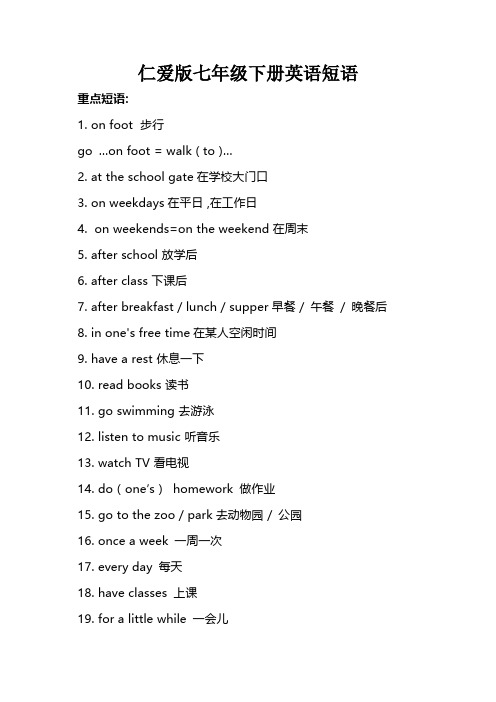
仁爱版七年级下册英语短语重点短语:1. on foot 步行go …on foot = walk ( to )…2. at the school gate在学校大门口3. on weekdays在平日 ,在工作日4. on weekends=on the weekend在周末5. after school 放学后6. after class 下课后7. after breakfast / lunch / supper早餐 / 午餐/ 晚餐后8. in one's free time在某人空闲时间9. have a rest 休息一下10. read books 读书11. go swimming 去游泳12. listen to music 听音乐13. watch TV 看电视14. do(one’s)homework 做作业15. go to the zoo / park去动物园 / 公园16. once a week 一周一次17. every day 每天18. have classes 上课19. for a little while 一会儿20. go to bed 上床睡觉21. come on 快点,加油,来吧22. get up 起床23. talk with / to sb.与某人谈话24. at school 在学校、在上课25. go to school 去上学26. and so on ……等等重点句型:1. --Happy New Year!--The same to you.2. --Your new bike looks very nice.--Thank you.3. --How do you usually come to school?--I usually come to school by subway.4. --How often do you go to the library?--Once/Twice/Three times a week/Very often/Every day/Sedom6. The early bird catches the worm.(谚语) 笨鸟先飞7. Work / Study must come first.工作/ 学习必须放在第一位!8. Classes begin at eight.=Class begins at eight.9. What time does the class begin?What time do the classes begin?10. We have no more time.我们没有更多的时间了。
仁爱版七年级下册Unit5_Topic1_知识点归纳
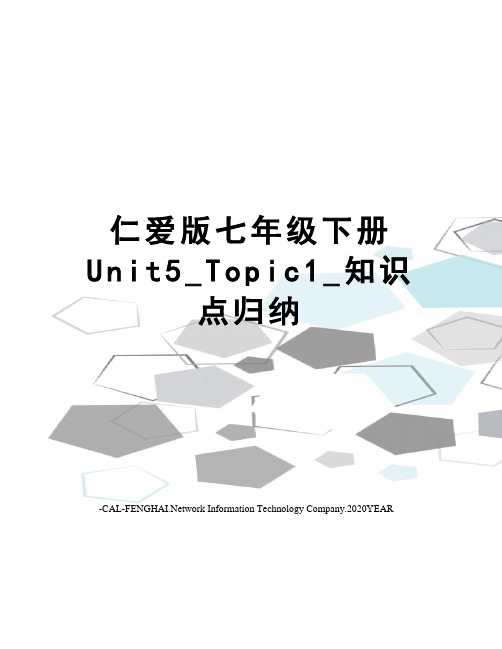
仁爱版七年级下册U n i t5_T o p i c1_知识点归纳work Information Technology Company.2020YEARUnit 5 Our School LifeTopic 1 How do you usually come to school?一、重点短语:Come on on foot take a bus by bus after school a short time listen toWatch TV know about be over in one’s free time on weekdays go to bed二、重点句型:1. I never come to school by subway.2. Maria sometimes takes the subway home.3. We usually go to the park on foot.4. I seldom walk to school.5. Li Xiang often rides a bike to school.6. They always go to the zoo by bus.7. --Happy New Year! --Happy New Year!/ The same to you.8. The early bird catches the worm.9. She goes to bed at about a quarter to ten.10. --How often do you come to the library--Three times a week./ Very often./三、重点知识点1. The same to you也祝你……。
用于别人向你祝福时对对方的回应,相当于You, too!e.g.-- Have a nice weekend!周末愉快! -- The same to you!也祝你愉快!2. look在此为系动词,表示“看起来……,看上去……”,后面接形容词。
仁爱版七下英语Unit6-topic1重要知识点和语法点归纳

Unit 6-Our Local AreaTopic 1 Is there a computer in your study?一、重点词汇1.first第一,one的序数词2.second第二,two的序数词3.floor 层,on the second floor在第二层地板,on the floor在地板上4.front前面(的),反义词back后面,后面的5.put放(动词)现在分词——putting6.left左边(的)反义词right 右边(的)7.away(副词)离开,不能在句子中做谓语,be away离开8.study n.书房 v.学习二、重点短语1. go upstairs上楼go downstairs下楼2. in the front of the house 在屋子(里面的)前面3.in front of the house 在屋子(外面的)前面4.talk about sth谈论,议论,讨论某事5. talk with sb. 与某人交谈6.put them /it away 把它们/它收起来7. look after = take care of照顾8. play with sb. 与某人一起玩 play with sth.玩弄某物9. in the tree(树本身以外物品)在树上 on the tree 在树上(树本身长出来的花、果、叶等)10.on the wall在墙上(表面) in the wall 在墙上(镶嵌在墙上,如:门、窗)11. tell sb about sth 告诉某人某事 =tell sb sth 12.have a look (at sth.)看一看(某物)13.and so on等等14.in the center of the yard在院子中央15.on the left/right of the yard在院子的左边/右边16.only a little只有一点点17.an apple tree一棵苹果树two apple trees 两颗苹果树三、重点句型1.Welcome to my new home.欢迎到我新家。
仁爱版七年级英语下册总复习重点短语和句型

仁爱版七年级下英语总复习材料Unit 5 Our School LifeTopic 1 how do you usually go to school ?1.at the school gate 在学校大门口2.Happy New Year! 新年快乐3.The same to you! 也同样祝你--- ---4.looks very nice! 看起来漂亮e to school 来上学e by bike= ride(s) a bike 骑自行车7.go by subway=take(s) the subway= in asubway乘地铁8.go by bus=take (s) a bus / in a bus / on abus 乘公共汽车9.by plane / by air /in a plane / on a plane乘飞机10.by car /in a car / take a car 坐小汽车11.by train / in a train / on a train / take atrain乘火车12.by ship/by boat / on a ship/boat / take theship 坐船13.go on foot=walk to 步行14.walk to school 走路上学15.watch TV 看电视16.do one`s homework 做家庭作业17.see a movie 看电影18.Good evening 晚上好19.want to do sth 想要做某事20.what time 什么时间21.get up起床22.on weekdays 周末23.at about six o’clock 在大约六点钟e on 快点25.It`s time for class 该上课了26.It`s time to have class 该上课了27.know about 了解--- --- 的情况28.school life 学校生活29.American students 美国学生30.take a yellow school bus 乘一辆黄色的校车31.have/has lunch 吃午餐32.at school 在学校,在上学33.eat out外出吃饭,上馆子34.on school days 在校期间35.have a short rest休息一会儿36.after lunch午餐后37.after supper/after dinner 晚饭后38.after class下课后39.after school放学后40.listen to music 听音乐41.read books看书42.go to the park 去公园43.go to the zoo去动物园44.go to the library去图书馆45.go to school去上学46.go to work去上班47.school is over 放学了48.class is over 下课了49.in one`s free/spare time50.在某人的业余时间里51.play basketball 打篮球52.play soccer 踢足球53.go swimming 去游泳54.go shopping 去买东西55.go fishing 去钓鱼56.go skating 去滑旱冰57.go skiing 去滑冰58.go climbing mountains 去爬山59.go hiking 去远足60.how often多久一次61.ball games 球赛62.have ball games 举行球赛63.four times a year 每年四次64.meet friends 见朋友65.once a week 每周一次66.twice a week 每周两次67.three times a week 每周三次68.Work must come first! 工作〔学习〕必须放在第一69.twenty past six 六点过二十分70.at twenty past six 在六点二十分71.have / has breakfast 吃早餐72.have / has lunch 吃午餐73.have / has supper 吃晚餐74.have / has dinner 吃晚餐75.half past seven 七点半76. a quarter past five 五点过十五分77.get home 到家78.go / goes to bed 上床睡觉79. a quarter to ten 十点过十五分80.drive a car 开小汽车81.the Great Wall 长城Topic 2 He is playing soccer on theplaygroundputer room 电脑室2.dining hall 食堂3.teachers` office 教师办公室4.classroom building 教学楼5.swimming pool 游泳池6.in the library 在图书馆7.in the dormitory 在宿舍里8.in the dining hall 在食堂里9.on the playground 在操场上10.at the moment = now此刻,现在11.clean the dormitory打扫宿舍12.clean the bedroom 打扫卧室13.clean the classroom 打扫教室14.clean the blackboard擦黑板15.make cards 制作卡片16.Would you like to --- --- ?17.你想做--- --- 吗?18.Good idea!好主意19.See you soon 一会儿见20.play computer games 玩电脑游戏21.May I borrow --- --- 我可以借--- ---吗?22. a few几个,一些23.Ren’ai Project English workbooks 仁爱英语练习册24.of course = sure = certainly 当然25.on time 准时26.in time 及时27.many students 许多学生28.do well in= be good at sth / doing sth在--- ---做得好29.do better in 在--- --- 做得更好30.31.on the shelf 在书架上32.return = give back 归还33.It’s a pleasure 不用谢34.Thank you all the same 还是要谢谢你35.lost and found 失物招领处36.looking for 寻找37.some money 一些钱38. a picture of my family 一张全家福照片39.thank you all the same 还是要谢谢你40.school student card 学生卡41. a pair of pants 一条裤子42. a pair of shoes 一双鞋43.two pairs of shoes 两双鞋44.singing in the room 在房间里唱歌45.dancing in the gym 在体育馆跳舞46.swimming in the gym 在体育馆游泳47.show sb around 带领某人参观48.in the center of= in the middle of 在------ 的中间,在--- --- 的中央49.on the left 在左边50.on the right 在右边51.next to 在--- --- 隔壁,在--- ---旁边,紧挨看,靠近52.at the back of 在--- ---后部,在--- --- 后53.near the playground 在操场的附近54.in the gym 在体育馆里,在健身房里55.in the swimming pool在游泳池里56.talk about their families 谈论他们家庭57.Attention, please ! 请注意!58.between --- and --在--- --- 和--- --- 之间59.stamp collection show 集邮展60.school hall 学校大厅61.every Saturday 每个星期六62.he is running 他在跑步63.in picture 1 在第一张照片里64.in picture 2 在第二张照片里65.look(looks) happy 看起来高兴66.love swimming 喜欢游泳67.talk to a Japanese girl和一个日本女孩交谈68.play the guitar 弹吉它69.in the classroom 在教室里70.in the office 在办公室里71.in the dormitory 在宿舍里72.on the playground 在操场上Topic 3 our school is very interesting1.What day 用来提问“星期几”2.have a music class 上一节音乐课3.at ten o`clock 十点钟4. a quarter to eleven 十点四十五分5.have a biology lesson上一节生物课6.have a geography 上一节地理课7.have a P.E. lesson 上一节体育课8.have an art lesson 上一节美术课9.outdoor activities 户外活动10.how many lessons 多少节课11.every week 每周12.singing and dancing唱歌跳舞13.drawing pictures 画画14.Working on math problems 做数学题15.speaking English 说英语16.learning about the past 了解过去17.an English book 一本英语书18.What do you think of it = How do youlike it ? 你觉得它怎么样?19.Difficult and boring 难学而且乏味20.Which subject 哪一门课21.Easy and interesting 容易又有趣22.Favorite subject 最喜欢的科目23.My school life 我的学校生活24.At school 在学校里,在上学25.Be friendly to sb = be kind to sb 对某人友好26.In the morning 在上午,在早晨27.In the afternoon 在下午28.I aften speak English with my classmates我经常和我的同学说英语29.After school 放学后30.Play basketball with my classmates和同学们打篮球31.On the playground 在操场上32.Every Tuesday 每周二33.Every Thursday 每周四34.school newpaper 校报35.School Time 校园时代36.And so on 等等37.Science Today 当代科学38.Thank sb for doing sth 感谢某人做了某事39.best wishes 致以美好的祝愿40.read stories 看故事书41.have a biology class 上生物课42.have breakfast 吃早饭43.run on the playground 在操场上跑步44.have a physics class上物理课45.watch animals 欣赏动物46.play soccer at school 在学校踢足球47.read a book at home 在家看书48.have dinner in the school dinning hall在学校食堂吃晚饭49.have dinner at home 在家吃晚饭Unit 6 Our Local AreaTopic 1 Is there a sofa in your study?1.On the second floor 在二楼2.Why not =Why don`t you为什么不--- --- ?3.Go upstairs 上楼4.Go downstairs 下楼5.Have a look 看一看6. A moment later 过了一会儿e in ,please 请进8.So many books 这么多的书9.On the shelf 在书架上10.You have a nice study你的书真漂亮!11.Dining room 餐厅12.Living room 客厅13.On the first floor 在一楼14.Cousins 表姐妹,表兄弟15.In the front of the house 在房子前面16.In the kitchen 在厨房17.In the study 在书房18.In the dinning room 在餐厅19.In the bedroom 在卧室20.In the garden 在花园21.Behind the door 在门后面22.Play with his pet dog和他的宠物狗玩耍23.Play games 玩游戏24.Clean the car 清洗小汽车25.Read books 看书26.Have dinner 吃饭27.Talk about 谈论28.Near my desk 在我桌子旁29.On your desk 在你桌子上30.So on 等等31.My family photo 我的全家福照片32.On the wall 在墙上33.Put them away 请把它们收起来放好34.Put it away,please把它/它们收起来放好35.Look after = take care of 照看,照顾36.In front the house 房子前面37.In the bottle 瓶子里38.Near the window 窗户边39.In the glass 杯子里40.Model planes 飞机模型41.Under the bed 床下42.How many pairs 多少双43.In the tree 树上44.On the tree 树上45.On the shelf 书架上46.On the river 河里47. A small garden 一个小花园48.Many beautiful flowers 许多美丽的花49.In the garden 花园里50. A big tree 一棵大树51.Under the tree 在树下52.Very beautiful 非常漂亮53. A large living room 一个在客厅54. A dining room 一个餐厅55. A kitchen 一个厨房56. A bathroom 一个卫生间57.I like watching TV in the living room我喜欢在客厅里看电视58.I love playing on the computer in thestudy我喜欢在书房里玩电脑59.In the drawer 在抽屉里60.On the chair 在椅子上61.Under the chair 在椅子下62.In picture A 图A里63.In picture B 图B里64.On the walls 在墙上65.In 在--- --- 里面66.On 在--- --- 上面67.Behind 在--- --- 下面68.Near 在--- --- 附近69.Next to 在--- --- 旁边70.In the front of 在--- --- 前面71.Don`t put it / them here 别把它/它们放在这儿72.Write a letter 写一封信73.Describe different rooms in your home描述你家不同的房间74.The things around your home 房子周围的事物75.I`m very glad to 我很高兴76.Get a letter from sb= hear from sb 收到某人的来信77.Tell sb about sth 告诉某人关于某事78.Tell sb to do sth 告诉某人做某事79.Tell sb sth 告诉某人某事Topic 2 What`s your home like?1.What`s your home like? 你家是什么样的?2.An apartment building 一座公寓3. A town house 城镇住宅4.Live with sb 和某从居住在一起5.Your grandparents 你的爷爷和奶奶6. A big farmhouse 农舍7.In the country 在农村8.Look for 寻找9.Let`s help him 我们去帮助他吧10.In our group 在我们小组11.For rent 出租12.Wanted 求租13.Small apartment for students小型学生公寓14.¥850 a month 每月850元15.Call Ms. Zhang 联系张女士16.House with three bedrooms 一套三居室的房子17.House with furniture for a family of three适合三口之家,家具齐全的房子18.Looking for a quiet double room 求租一间安静的双人间under ¥300 per month 月租低于300元19.Apartment for a family of two 适合两口之家的公寓20.House with four bedrooms 四居室21.Quiet double room 安静的双人间22.Excuse me 打搅了,打搅一下,劳驾,23.Your new neighbor 你的新邻居24.I`m looking for a store我在找一家商店25.On the street corner 在街道拐角处26.Post office 邮局27.Bookstore 书店28.Museum 博物馆29.Parking lot 停车场30.Supermarket 超市31.Hospital 医院32.Bank 银行33.Train station 火车站34.Park cars 停车35.Keep money 存钱36.Take trains 乘火车37.See a doctor 看医生38.Buy food 买食物39.Mail letters 邮寄信40.Buy books 买书41.Keep and show things保存和陈列物品42.Bookstored 书店43.Restaurant ['restərənt] 饭店44.I`m afaid it`s too loud 恐怕声音有点儿大45.I`m really sorry about that 十分抱歉46.At the end of 、Road 在、、、路的尽头47.On the right 在右边48. A tall tree 一棵大树49.Lot of = lots of 许多50.Tall buildings 高楼51.Small gardens 小花园52.Close to 离--- --- 近,紧挨着的53.Far from 离--- --- 远54.Not far from 离--- --- 不远55.Call it for help 打向它求助56.How is the community? 社区是什么样的?57.Living near your home 住在你家附近58.Do you like living there?59.This is linda speaking. 我是琳达60.61.What`s the matter? 有什么事吗?62.There is something wrong with =Something is wrong with某人/某物出问题,有毛病了63.Right now 立刻,马上64.From--- to--- 从--- --- 到--- ---65.The traffic is heavy 交通拥挤66.The cost of living is high生活费用高67.Houses with big yards带大院子的房子68. A house with a garden 有花园的房子Topic 3 How can I get to the bookstore?1.Go up this street to the end 沿着这条街一直走到尽头2.On your left 在你左边3.How can I get to--?我怎样才能去--- --- ?4.Go along Xinhuan Street 沿着新华路走5.Turn left at the first street 在第一条街口向左转6.Go across the bridge 穿过桥7.It`s about one hundre meters along on theright 顺着右边走大约100米〔就到〕8.Which is the way to--- ? 哪一条是到--- --- 路?9.The post office 邮局10.I`m new here 我对这儿不熟11.On 在--- --- 上面12.On the corner of 在--- --- 拐角处13.Across from 在--- --- 正对面14.Between --- and --在--- --- 和--- ---之间15.Near the bridge 在桥的附近16.Turn left and walk on 向左拐并一直往前走17.You can`t miss it 你不会错过的18.Beitai Road 北台路19.Be --- away from 离--- --- 远20.Need to do sth 需要做某事21.Take bus No.718 乘坐718路车22.Change to the No.108 bus at AnzhenBridge 在安贞桥换乘108路车23.The way to Shuanxiu Garden 去双秀花园的路24.At Liuli Bridge 六里桥25.How far “多远”,问距离。
- 1、下载文档前请自行甄别文档内容的完整性,平台不提供额外的编辑、内容补充、找答案等附加服务。
- 2、"仅部分预览"的文档,不可在线预览部分如存在完整性等问题,可反馈申请退款(可完整预览的文档不适用该条件!)。
- 3、如文档侵犯您的权益,请联系客服反馈,我们会尽快为您处理(人工客服工作时间:9:00-18:30)。
Unit 5重点短语及句型Unit 5 Topic 11. the same to对…也一样2. come on 快点儿加油3.go…on foot=walk 走路步行4. go to school 去上学5. on weekdays在工作日6.do one’s homework做家庭作业7.watch TV看电视8.at school在学校9.go to bed睡觉10.play basketball 打篮球11.go swimming去游泳12. listen to听13. once a week每周一次14.twice a week 一周两次15.three times a week一周三次16.have lunch吃午饭17. in one’s free/spare time 在某人的业余时间18. the Great Wall长城19. have classes上课20.talk to sb 和某人交谈21.be different from 与…不同22. by subway坐地铁23. by plane坐飞机24. by train坐火车25. come …by bike=ride a bike骑自行车26.go…by bus=take a bus坐公共汽车27.after school放学后28. for a short time 一段短时间29. how often 多经常①--- Happy New Year! 新年快乐!---The same to you. 你也一样。
(新年快乐!)②--How do you usually come to school?你通常怎样来上学的?--I usually come to school by subway.③ Oh, it’s time for class. 噢,是时候上课了。
④--How do you usually come to school?你通常怎样来上学的?回答可以用go/come...by+交通工具来回答。
如--I usually come to school by subway/ by bike/ by bus/ by boat/by ship/ by plane/by car或I usually come to school on foot.频度副词always,usually, often,sometimes,seldom 和never. 频度副词用于一般现在时,表示动作发生的频度,一般放在be动词后或谓语动词前。
如主语为第三人称单数,动词要+s/es。
⑤--What does Han Qing usually do after school?韩青放学后通常做什么?--He usually plays soccer, but he doesn’t play basketball.他通常踢足球,但他不打篮球。
注意:play soccer, play basketball, play+球类中间不能加a或the⑥---How often do you come to the library?你有多经常来图书馆?--- Three times a week.一周三次。
⑦--We’d like to know about the school life of American students.我们想了解一下美国的学校生活。
⑧What do they do in their free time?他们在空余时间做什么?⑨I’m sorry we have no more time. 很抱歉我们没更多的时间了。
⑩Nice talking to you.很高兴与你谈话。
Unit 5 Topic 21.make cards 制作卡片2.dining hall 餐厅3.swimming pool 游泳池4.do some cleaning打扫卫生5. of course 当然6. look for寻找7.on the shelf 在架子上8. on time准时按时9.show sb around 领某人参观10.a few 一些,少量11.at the back of 在…的背后12.draw pictures 绘画13. on the playground在操场上14.in the gym在健身房15. borrow sth from sb 向某人借某物16. look for 寻找17.have a soccer game 进行一场足球比赛18. one day 有一天①--What are you doing now?你现在在做什么?②Are you doing your homework?你现在正在做作业吗?③ I’m making cards. 我正在制作卡片。
④Excuse me, may I borrow some English workbooks?打扰了,我可以借一些英语练习册吗?borrow sth. from sb.向某人借某物(借入)lend sth. to sb.借某物给某人(借出)⑤How long can I keep them?我可以借(这些书)多久呢?用How long 提问,只能用延续性动词keep回答,keep 在这里也是“借”的意思,Borrow和lend都是短暂性动词,不能与表示持续的时间状语连用。
如I want to borrow the book for two day s. ( × )I want to keep the book for two days. ( √ )⑥The girl looks for the books on the shelves.那个女孩在书架上找书。
⑦A few students are running around the playground.一些学生正在围绕操场跑步。
A few 表示一些,几个,表示肯定。
Few表示“很少,几乎没有”表示否定。
两者都可以修饰可数名词的复数形式。
如:I have a few friends.我有一些朋友。
He is new here, he has few friends here. 他是新来的,他几乎没有朋友。
⑧The boy is drawing pictures. He isn’t cleaning the blackboard.那个男孩正在画画,他不是在擦黑板。
现在进行时的基本结构是be+v.ing, 否定形式是在Be动词后加not.⑨He looks happy because he loves swimming.他看起来很高兴因为他很爱有用。
Because意为“因为,因此”引导一个原因状语从句。
⑩I also want to visit it one day.我也想有一天去参观长城。
also意为“也”,一般放在句中;too也是“也”,但too放在句子末尾,前面用逗号隔开,either 用于否定句。
如:He likes reading, he also likes swimming.(also用于句中)He likes swimming, I like swimming, too.(too 用于肯定句)He doesn’t like swimming, I don’t like swimming, either.(either用于否定句)Unit 5 Topic 31. think of 认为2. work on致力于3.talk about 谈论4.be kind to sb对某人友好5.some other subjects 其他一些科目6.outdoor activity 户外活动7.tell sb about sth 告诉某人关于某事8.between…and在…和…之间9.from… to 从…到…10. learn sth from sb 从/向某人学习某事11. have a music class 上音乐课12. the next class 下一节课13.help each other 互相帮助14. like…best 最喜欢15.speak English with sb 和某人说英语16. thank you for doing sth谢谢你做某事①What day is it today? 今天是星期几?②—What class are they having? ----他们在上什么课?—They are having a music class. ----他们在上音乐课。
③What time does the next class begin? 下一节课什么时候开始?④H ow many lessons does he have every weekday?他每个平日要上多少节课?⑤I think you must like English very much. 我想你一定很喜欢英语。
⑥—What do you think of it? ----你认为它(英语)怎么样?—I don’t like it. It’s a little difficult.----我不喜欢。
它有点难。
⑦I like history very much because it’s very interesting.我非常喜欢历史,因为它很有趣。
⑧It’s time for class. 该上课了。
⑨—Which subject do you like best?你最喜欢哪门科目?—I like history best. 我最喜欢历史。
⑩At school, my teachers and classmates are very kind to me.be kind to...意为“对......友好”,相当于be friendly/nice to ...。
kind也可作名词,意为“种类”,如many different kinds of... 许多不同种类的......⒒I study Chinese, English, math, politics, art, history, geography, biology and some other subjects.other指“另外的,其他的”,常与复数名词或不可数名词连用,如:I like Lucy and some other students.我喜欢Lucy和一些其他同学。
⒓I can learn a lot from it. 我能从中学到很多(知识)。
⒔Thank you for your hard work. 感谢你的努力。
